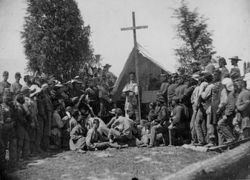 Battles in Virginia this day yield mixed results. On this third day of the Battle of Petersburg, Union forces inch closer to capturing the strategic city of Petersburg. Yet their efforts fall short, and on the morrow Confederate General Robert E. Lee and reinforcements arrive in time to prevent the Federals–at this juncture–from taking the city. Repulsed but not driven from the field, Union General Ulysses S. Grant‘s Army of the Potomac, led by General George C. Meade, digs in and lays siege to Petersburg.
Battles in Virginia this day yield mixed results. On this third day of the Battle of Petersburg, Union forces inch closer to capturing the strategic city of Petersburg. Yet their efforts fall short, and on the morrow Confederate General Robert E. Lee and reinforcements arrive in time to prevent the Federals–at this juncture–from taking the city. Repulsed but not driven from the field, Union General Ulysses S. Grant‘s Army of the Potomac, led by General George C. Meade, digs in and lays siege to Petersburg.
Meanwhile, in the Shenandoah Valley of Virginia, the Union Army of West Virginia, under the command of Major General David Hunter, attempts to capture the city of Lynchburg but is repulsed by the forces of Confederate Lieutenant General Jubal Early. Lynchburg is a strategic supply city for the Confederates, as well as a significant railroad connection for the South. The failed offensive against Lynchburg, alongside the ongoing battle at Petersburg, serve notice that the Union is intent on chocking off supply routes of Confederate forces.
As the fighting rages nearby, today’s Richmond Daily Dispatch reports on a change of ministry for the Rev. James B. Taylor, Jr., Richmond native, son of the Baptist minister Dr. J. B. Taylor, and a chaplain in Lee’s Army of Northern Virginia.
–Rev J B Taylor, Jr, of this city, though for two years chaplain of the 10th Va cavalry, has accepted an appointment as General Evangelist and Agent for the Baptist Colportage Society, located in this city, and will spend some months in Alabama. Rev Mr Taylor has had the reputation of being one of the most attentive, laborious, and talented chaplains in the army, having rarely ever been absent from his regiment even on the march. By thus sharing the toils and dangers of the soldier, and watching for his soul as one that must give account, he has greatly endeared himself to officers and men. He has entered a wider and more inviting field, and we wish him great success.
In this fourth year of the war, Southern Baptists are focused on army missions and chaplains more than ever, the sinking fortunes of the Confederacy seemingly adding fuel to their evangelistic intensity directed at soldiers.
Young Taylor’s work is celebrated by many white Baptists of the South. When the war is over, his war-time faithfulness to God and country most likely is of help as he begins a career in the pastorate.
Sources: Battle of Petersburg (link) and (link) and (link); Battle of Lynchburg (link) and (link) and (link); “Taylor, Rev. James B., Jr.”, in William Cathcart, The Baptist Encyclopedia, Vol 2., Philadelphia: Louis H. Everts, 1883, pp. 1135-1136 (link); “Going South,” Richmond Daily Dispatch, June 17, 1864 (link);


